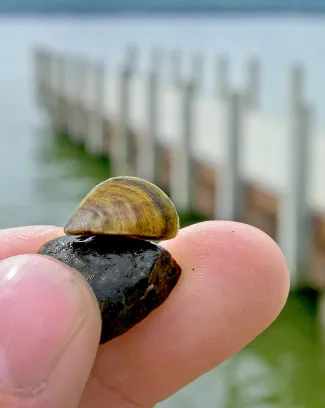
Biologists with the Oklahoma Department of Wildlife Conservation and the City of Oklahoma City confirmed invasive zebra mussels have found their way into Lake Hefner, a water-supply reservoir in northwestern Oklahoma City.
"Zebra mussels are a serious threat," said Curtis Tackett, aquatic nuisance species biologist for theOklahoma Department of Wildlife Conservation.
The mussels damage water intake structures and clog up waterways. Because they aren't native, they can harm populations of native species that compete for resources."
Zebra mussels potentially pose a multibillion-dollar threat to industrial and public water supplies. They have infested about 20 lakes in Oklahoma by moving through river systems and hitching a ride on boats that are used in several lakes and not properly cleaned.
An angler at Lake Hefner reported seeing zebra mussels to Oklahoma City officials and to the Wildlife Department. Water analysis by a nationally accredited laboratory confirmed the presence of juvenile zebra mussels. City and Wildlife Department personnel then surveyed the lake and discovered several large concentrations of adult zebra mussels.
Tackett said water samples are taken from Oklahoma lakes on a rotational basis to test for the spread of this aquatic nuisance species. Lake Hefner was last tested in 2011. "We are confident this is a recent infestation," he said.
These mussels face little competition and have few predators. Once zebra mussels have infested a water body, they can reproduce quickly. "One female zebra mussel can produce up to a million offspring per year, and they can begin to reproduce within weeks of settling," Tackett said.
Besides the potential harm they can cause to an aquatic ecosystem, zebra mussels often take a sizable financial toll as well. These mussels congregate in water intake structures, driving up the cost of maintaining a functioning system. They can clog water intakes on boat motors and create costly repairs. And they can create unsightly colonies on docks and boat hulls, and can end up cutting the feet of swimmers in lakes where swimming is permitted.
"Unfortunately there are no feasible lakewide treatment options to eradicate the invasive mussels, but we want to remind lake users to Clean, Drain and Dry their boats and equipment when leaving any lake that may be infested with aquatic nuisance species," Tackett said.
The Wildlife Department and Oklahoma City are coordinating outreach efforts to educate boaters and anglers to take steps to deter the spread of zebra mussels to other lakes statewide, especially the other Oklahoma City metro water bodies.
The primary way zebra mussels spread is via trailered boats. To deter the spread of zebra mussels, all boaters should:
Inspect boats, trailers and equipment for mussels or mud, plants, seeds or other organisms from the water and remove them.
Drain water from boats, motors, bilges, live wells, bait containers, coolers and ballasts.
Pressure-wash boats, trailers and equipment with hot water (140 degrees).
If unable to pressure-wash their boats and equipment, boaters should allow a thorough drying period -- at least five days -- before visiting a new body of water.
Among Oklahoma waters now infested with zebra mussels are Kerr Reservoir, Keystone Lake, Skiatook Lake, Oologah Lake, Grand Lake O' the Cherokees, Kaw Lake, Lake Eufaula, Sooner Lake and Lake Texoma.
Go online to nas.er.usgs.gov/taxgroup/mollusks/zebramussel for more information on zebra mussels. For local assistance with zebra mussels, call Fisheries biologist Keith Thomas at (405) 325-7288 or Oklahoma City fisheries biologist Bob Martin at (405) 297-1426.